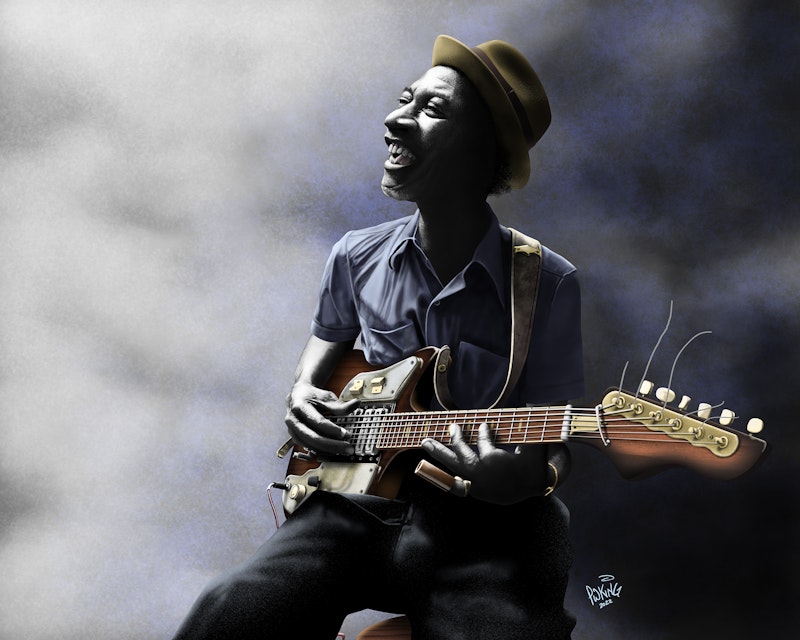The opening distorted notes of Theodore Roosevelt "Hound Dog" Taylor's "Philip's Theme" are all squeal and shiver; it sounds like the guitar's in agony. Then the drums come in, muffled and threatening, like they're trying to squash that agony flat. If you're a rock fan, it'll be immediately familiar—it's basically the intro to Led Zeppelin's "You Shook Me," with a more river-bottom mud and less Sturm und Drang.
Hound Dog Taylor and the Houserockers, the debut album by the Mississippi-born, Chicago-steeped blues guitarist, was the first release on the legendary Alligator Records label in 1971. That means it came out two years after Zeppelin's "You Shook Me." It's possible Taylor heard the recording, but doubtful he was using it as a blueprint. The similar sound is more likely the result of similar influences—Delta blues—and the fascination with the possibilities of (over-) amplification introduced by figures like Howlin' Wolf and Muddy Waters. Zeppelin, and the rock revival in general, were in debt to Elmore James, who’s represented on Taylor's album with three covers ("Held My Baby Last Night," "Wild About You, Baby," and "It Hurts Me Too.") Taylor and Jimmy Page were taking the same sources and doing (more or less) the same thing to them.
In the early-1970s, Blues was the source, with a limited audience. Rock had international appeal. From our vantage some 60 years on, though, after rock itself has largely been relegated to a specialist interest like blues before it, the supposed distinction between authentic progenitor and popular apotheosis has been flattened—or, in Taylor's case, drowned in the swamp.
The guitarist's initial album is a beautiful slab of filthy feedback; every note’s been frayed within an inch of its life. Some tracks, like "She's Gone" or "It Hurts Me Too" are droning slogs, where the music can barely move under the weight of the blues. Taylor sounds like his heart, or maybe his intestine, has been pulled out when he wails "It hurts me!"
For other songs, like "Walking the Ceiling" or "55th Street Boogie" Taylor picks up the pace, locking into a rock ‘n’ roll tempo that speaks more of grinding knowledge than teen innocence. "Give Me Back My Wig" in particular feels like Chuck Berry's "Maybelline" after the car has experienced a fearful collision. The guitar struggles somewhere near the right tuning; the drums race to catch up, scrambling up the side of the ditch. "Give me back my wig! Honey, you let your hair go bald!" Taylor yowls and chortles down in the mix. Punk rock rarely sounds this disturbingly messy.
The wordless "Philip's Theme" is the highlight of the album. Taylor isn't generally thought of as a guitar virtuoso—he famously performed on bottom-drawer cheap instruments. But the playing is remarkable, partly because it isn't as clearly focused and controlled as Hendrix or Page. The guitarist often seems like he's catching up with his fingers or chasing along behind the distortion; the sound is simultaneously fleet and stoned, raunchy and propulsive, while over in the corner drummer Ted Harvey whacks away at the skins like he's taking shots at Taylor's skull. The band is trying to play classic rock and gloriously failing—or you could say all those primitivist Stones and Stooges and George Thorogoods (a huge Taylor fan) were trying to get that low down in the mud but couldn't root that deep.
It wasn't just rock musicians who had trouble matching Taylor's gutter grunge; few of his predecessors or blues peers attained his level of ugly either, though some (like James Cotton) tried.
Delmark records wouldn't record Taylor because his sound was so off-putting. His music comes across like a primal roar and wallow, but it was very much of its time. That time was one in which a range of oddball performers—Page, Iggy Pop, Hendrix, Ozzy Osbourne, Captain Beefheart, James Brown, George Clinton—were picking up the blues and exploring the possibilities of strange new tech. Taylor isn't as well known or as celebrated as some of the others, since he mostly confined himself to blues clubs and Black audiences. As a result, Hound Dog Taylor and the Houserockers doesn't generally get on lists of greatest albums or greatest rock albums. But it should.

